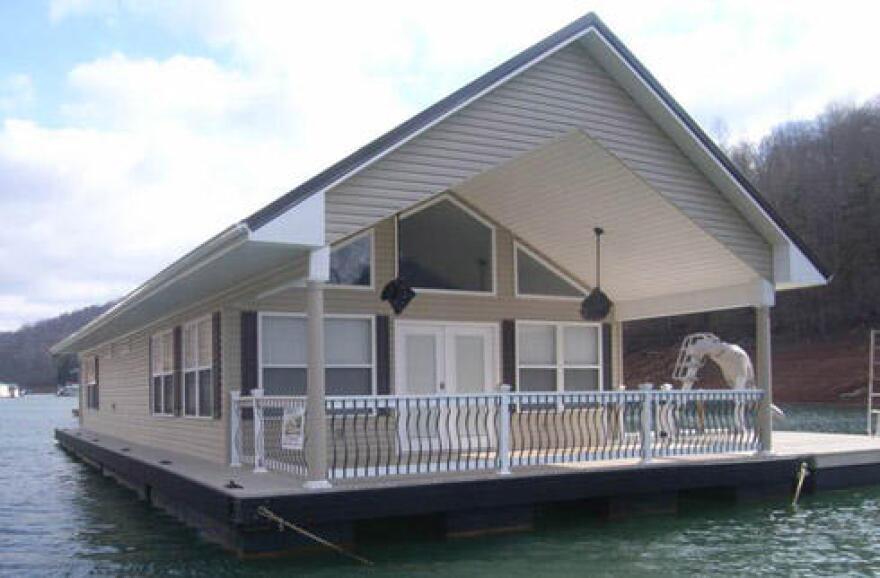The Tennessee Valley Authority has moved to eventually ban all floating homes on public waters in what members called their most contested issue in recent years.
The TVA board of directors met Thursday at Paris Landing State Resort Park.
TVA serves as steward of the region’s natural resources and manages 293,000 acres of land and 11,000 miles of shoreline in five states. The government-owned energy corporation has allowed private use of the more than 1,800 stationary, non-navigable houseboats on public waters since 1978 so long as they met environmental and safety standards. By TVA's estimate, approximately 50 percent of those do not have permits nor meet minimum standards to maintain use of public waters.
But a recent proliferation in unapproved structures has caused TVA to re-examine the lax policy.
In February, TVA released the final impact statement of a 2-year report into the floating house issue raising concerns for safety, environmental regulations and fair use of publicly-owned property.
After 3 hours of public comment and lengthy deliberation, the board went on to vote 7-2 in favor of the policy to enact a 30-year sunset policy on existing houses, restrict construction on new structures and ensure all existing homes meet the safety and environment standards put forward by TVA.
TVA Floating Home Alliance President Mike Wilkes says the Authority's new approach doesn’t reflect the nature of most floating house owners whose homes were built before 1978 and grandfathered in.
“They painted a very broad picture out there that we’re these rogues that are there taking from the public, and we're just not," said Wilkes. "98 percent of these homes are moored in the harbors, they’ve been approved [by TVA], it’s not like you’re going to see a home pop up and not notice it."
Mark Godsey, an owner of a houseboat property on Norris Lake in eastern Tennessee, says he bought an existing home as a safe investment.
"This was a substantial investment for me," said Godsey. "I had money that I had saved my entire life sitting in a bank account. I'm one of those people that wants to keep the house the rest of my life but if I'm in a financial situation where I need to sell it, I need to get that money back."
He says he called a TVA representative when he first heard that a sunsetting policy was being considered.
"I said 'is this something I need to worry about?'," said Godsey. "And the reaction, I'll never forget these words, there was a chuckle: 'if they ever recommend sunsetting, I sure as hell wouldn't want to be at that meeting.' I don't think anyone intentionally mislead us, but we were told that this wasn't a real possibility."

A tearful Deborah Hardy expressed that the issue expands beyond a 30-year period.
‘This is our children’s legacy, this is my retirement, this is what I give to them," said Hardy. "And I beg you not to take this away from them. There is a better option, we can all work together, we need to pull together... and do the right thing.”
In all, 56 citizens had registered to comment before the board. Public Relations Director Chris Stanley says that's a record turnout for commenting before a TVA board meeting.
TVA President Bill Johnson says that the issue had garnered the most public feedback of anything in his time in management.
"This was a very tough issue, both for the board and for the staff, this had the most input of anything in my time here, and had the most political interest," said Johnson. "But this board and this organization have a duty of stewardship of public assets. And what was being asked for was permanent use of public property. The idea that these floating homes have a perpetual right to stay on assets owned by the public does not seem to me to be a particularly good stewardship resolution."
“Like national and state parks, which prohibit private residential use of public resources, the land and water we manage are owned by the public," said Johnson. "We have taken care to consider all perspectives on this issue, as well as the environmental and safety impacts, and believe this is the correct course of action for everyone.”
TVA Board member Eric Satz says he agrees with the policy but that TVA has an obligation to those affected.
“We have blundered over time such that folks face real potential investment loss," said Satz. "I think that providing for a 30 year sunset period, we buy ourselves time. I believe the burden is on us, the TVA, to mitigate any economic loss that may be suffered as a result of our inactions in the past or any action that we make here today."
The TVA will now examine the legal structuring of the new policy as it will be instituted over the next 30 years.




